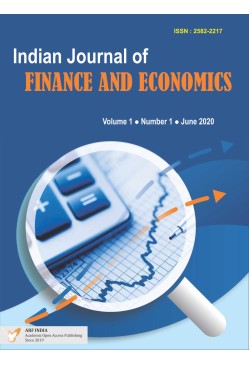
Indian Journal of Finance and Economics
Frequency :Bi-Annual
ISSN :2582-2217
Peer Reviewed Journal
This study revisitsthe association between the market, exchange rate and interest risk measuresand accounting variables of the 36 major Indian banks. Using data from April, 2001 to March 2015, we investigate such relationships following two step procedure. First, we use multi-index GARCH model to estimate the risk measures of market, interest rate and nominal effective exchange rate (NEER). In the second stage, regression analysis is conducted to find out the relationship between these risks measures with the banking sector specific financial ratios.The first stage analysis results show that market risk measures are consistently significant for entire study period. We also find significant association of these risk measures with the financial ratios for the Indian banks.
Keywords: Banking Sector;Exchange Rate;Interest Rate; Market Risk.
JEL Classification: G12; G21; C52
This study examines the effect of monitoring mechanisms on corporate environmental accounting disclosure of Nigerian listed Deposit Money Banks (DMB’s) for the period of 2009 – 2018. The population and the sample size of the study consist of the fourteen (14) listed Nigerian DMBs as at 31st December, 2018. Specifically, the study seeks to find out if monitoring mechanisms (proxied by firm size, firm age, leverage, dividend and earnings) have any effect on banks’ corporate environmental accounting disclosures (CEADs). The study employed multiple regression techniques and data were collected from secondary source through the annual reports and accounts of the listed firms. The findings reveal that firm size, firm age and dividend per share are statistically, positively and significantly influencing the CEA disclosures of Nigerian listed DMBs but at 1% level of significance, while leverage and earnings per share were found to be statistically and insignificantly related with CEA disclosures. The study recommended that banks’ management should intensify efforts towards expanding their assets, justifying the reasons for their quotation, making high and a consistent dividend payment, strengthening their earnings generation capacity while improving their gearing ratio through ensuring a reasonable balance between debt and equity as it has been found empirically to be a monitoring attributes for banks to engage in corporate environmental accounting disclosures.
Keywords: Monitoring Mechanisms, Environmental Disclosure, Leverage, Firm Age, DMBs
Now the world dynamics have been analysed into two aspects, pre covid- 19 era and the post covid-19 era. The scientists, economists, environmentalists, politicians etc all are mainly focusing only on this issue. Under these circumstances an attempt in this paper has been taken to investigate the possibilities of association between Covid-19 which is popularly known as Covid- 19 Pandemic with globalization or openness of the global economy. Or whether the level of economic development is related somehow with this pandemic? Ordinal Logistic regression model is used in this study and the data are taken from WHO, World Development Report, World Development Indicators etc. This study shows that degree of openness is positively affects the log of Odds of cumulative probability of covid-19 infections.
Key Words: Covid- 19 , Ordinal Logistic regression, Degree of Openness, Level of Development, consciousness.
In the light of mismatch between demand and supply of land in urban areas, spiraling land prices, rapid urbanization, increased number of court litigations, expensive and time-consuming existing land acquisition legislations, weak financial status of various semi-government local bodies, disturbing economic crisis in several nations, speculative nature of land markets, lack of innovation in land management techniques, procurement of land in recent years becomes almost highly difficult task for effective implementation of urban projects, redevelopment of areas, affordable housing, creation of new cities and renewal of urban core areas and other urban solutions. So, appropriate land procurement, planning, development, utilization and management strategies are needed to cater to the growing urban requirements. Against this background, an attempt is made in this paper to review the existing urban land management practices in India.
Land, a gift of nature, is precious, precarious, and productive property since the Rig Vedic times. The OED defined the Anglo-Saxon word ‘Land’ as the solid portion of the earth’s surface opposed to sea and water. The Indian Constitution, Article 19, guaranteed that all citizens have the right to acquire, hold and dispose of property. The Law of Property Act (LPA) of UK, 1925, amended by the Trusts Of Land and Appointment of Trustees Act (TOLATA) of UK, 1996, the Interpretation Act of UK, 1978, the Land Registration Act of UK, 2002, state that land is the surface, buildings and other structures, covered with water, and any estate, interest, easement, servitude or right in or over land.
In India, Land Acquisition Act, (RFCTLARR), 2013, enacted by the Parliament in the Sixty-Fourth Year of the Republic of India on the 27th Day of September, 2013, and came into force with effect from 01st Jan, 2014, repealing and replacing Colonial Land Acquisition Act, 1894, ensuring a humane, participative, informed and transparent process for acquisition of land with the least disturbance to the owners and other affected for the purpose of industrialization, development of infrastructural facilities and urbanization. It’s a right move in rem and in persona in the right direction at an appropriate time aimed at encouraging just, true and fair process of land acquisition. In this direction, the paper casts a light on anecdotal and objective evidences of Land Acquisition in comprehension and the judicial precedents of Hon’ble Supreme Court of India and High Court of Andhra Pradesh in concise.
Land Pooling (LP) is an addendum, an extension and compelling alternative to Land Acquisition considering operational woes and providing win-win solutions. The liveliness and distinctiveness of ‘Land Pooling’ lies in identifying Strengths,